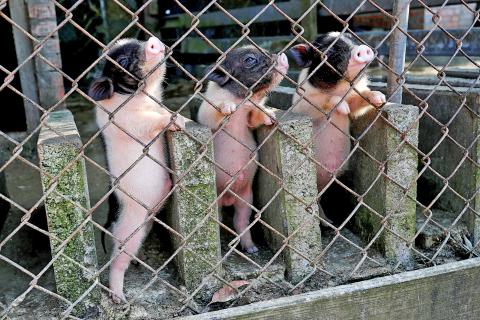With the Year of the Pig starting on Tuesday, pig lovers fear that a rush of people wanting to usher good fortune into their homes by getting a piglet as a pet could lead to a wave of abandoned animals.
Anita Chen, who runs a social media forum for owners of pet pig and has two pigs at her home in Taipei, said that the first thing owners have to consider is their freedom and flexibility.
Pigs like her Xin Xin and Mei Mei have the intelligence of a five-year-old child and can open everything from fridges to doors and drawers, often removing everything inside, to the horror of their homecoming owners, Chen said.

Photo: Reuters / Tyrone Siu
“Piglets are very attached to people, they will constantly squeak to make you play with them or feed them,” she said, adding that many overwhelmed owners abandon piglets after just a few months.
Visitors at a petting farm in Taoyuan get a kick out feeding milk to piglets in a pen, and many want to take one home.
“We don’t advise this, as they are farm animals,” farm owner Yang San-guei said.
Bama pigs, the species most commonly kept as pets in Taiwan, might be small and cute when they are young, but can grow to a hulking 60kg, Yang said.
However, if visitors will not be warned off, Yang said he is willing to sell piglets for NT$3,000.
The other little pigs go to market when they outgrow their pen.
Veterinarian Chang Chien-ming said that anyone thinking of getting a pig should their research them thoroughly to avoid nasty surprises “so that they know how big these pigs can grow, find a veterinarian, and educate themselves about medical and nutritional aspects,” Chang said.
He said he had also seen renewed enthusiasm for pigs as pets over the past year.
Veterinary clinics willing to treat pigs are difficult to find, with only one-in-100 accepting pig patients, Chang said.
Many owners quickly realize that having a porcine pet can seriously crimp their holiday plans. Pet hotels do not accept pigs.
Abandoned pigs in Taiwan have a harder time finding a new home than cats and dogs.
Publicly funded shelters do not accept pigs, as they are not classified as pets, leaving it to pet lovers or private shelters to take them in.

Taiwanese can file complaints with the Tourism Administration to report travel agencies if their activities caused termination of a person’s citizenship, Mainland Affairs Council Minister Chiu Chui-cheng (邱垂正) said yesterday, after a podcaster highlighted a case in which a person’s citizenship was canceled for receiving a single-use Chinese passport to enter Russia. The council is aware of incidents in which people who signed up through Chinese travel agencies for tours of Russia were told they could obtain Russian visas and fast-track border clearance, Chiu told reporters on the sidelines of an event in Taipei. However, the travel agencies actually applied

Japanese footwear brand Onitsuka Tiger today issued a public apology and said it has suspended an employee amid allegations that the staff member discriminated against a Vietnamese customer at its Taipei 101 store. Posting on the social media platform Threads yesterday, a user said that an employee at the store said that “those shoes are very expensive” when her friend, who is a migrant worker from Vietnam, asked for assistance. The employee then ignored her until she asked again, to which she replied: "We don't have a size 37." The post had amassed nearly 26,000 likes and 916 comments as of this

New measures aimed at making Taiwan more attractive to foreign professionals came into effect this month, the National Development Council said yesterday. Among the changes, international students at Taiwanese universities would be able to work in Taiwan without a work permit in the two years after they graduate, explainer materials provided by the council said. In addition, foreign nationals who graduated from one of the world’s top 200 universities within the past five years can also apply for a two-year open work permit. Previously, those graduates would have needed to apply for a work permit using point-based criteria or have a Taiwanese company

The Shilin District Prosecutors’ Office yesterday indicted two Taiwanese and issued a wanted notice for Pete Liu (劉作虎), founder of Shenzhen-based smartphone manufacturer OnePlus Technology Co (萬普拉斯科技), for allegedly contravening the Act Governing Relations Between the People of the Taiwan Area and the Mainland Area (臺灣地區與大陸地區人民關係條例) by poaching 70 engineers in Taiwan. Liu allegedly traveled to Taiwan at the end of 2014 and met with a Taiwanese man surnamed Lin (林) to discuss establishing a mobile software research and development (R&D) team in Taiwan, prosecutors said. Without approval from the government, Lin, following Liu’s instructions, recruited more than 70 software